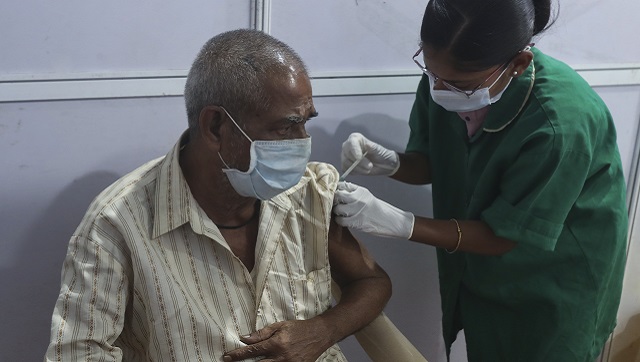The Madras High Court on Thursday raised concerns about the pricing of the COVID-19 vaccines and noted that Rs 600 per dose might impose a “financial burden” on members of lower income groups in India. A Bench headed by Chief Justice Sanjib Banerjee took suo motu cognisance of media reports on the COVID-19 situation in Tamil Nadu, and questioned AG Vijay Narayan on the state government’s provisions of the remdesivir drug, medical oxygen, ventilators, and COVID-19 vaccines. Follow LIVE updates on COVID-19 here Taking note of the new pricing structure which will be implemented from 1 May, the Madras High Court said that the new prices might create a “financial burden” for people between the age group of 18 to 45 and “leave them in a lurch”, Bar and Bench reported. “In particular, the cost of the vaccine at Rs 400 per shot from government counters and at Rs 600 per shot from private counters may be beyond the reach of a large section of the population, particularly considering the family structure in this country.”
“Appeal made to Union (government) to consider how the less privileged and people rendered without basic resources and adequate jobs in the wake of the lockdown of last year may be able to afford vaccine at such high cost. Hoped appropriate steps would be taken to take care of the lowest denominations,” the court added.
“If people do not take the vaccine, they remain carriers and spreaders. This aspect of the matter must engage your attention,” the court told Narayan. The court’s comments come days after the Centre modified its vaccination policy. On Monday, the Union government announced a slew of changes, including allowing inoculation for everyone over the age of 18 and allowing state governments to procure the vaccines directly from the manufacturers from 1 May. The Centre also allowed vaccine manufacturers to set their own price for the supply to state governments and private buyers. Accordingly, the Serum Institute of India — which is manufacturing the ‘Covishield’ vaccine — said that it will price each dose at Rs 400 for state governments and at Rs 600 for private hospitals. Madras HC questions Tamil Nadu govt over availability of oxygen, remdesivir In addition to putting on record its concerns about the cost of COVID-19 vaccines, the high court sought information from the Tamil Nadu government about the availability of medical facilities in the state. Several states including Maharashtra, Delhi, and Uttar Pradesh are running severely short of oxygen cylinders, ventilators, and COVID-19 drugs like remdesivir. On the availability of remdesivir, AG Narayan submitted that Tamil Nadu is “one of the few states without shortage”. “(The state has) 31,0000 vials of remdesivir, which is more than enough to meet contingencies. True that some private hospitals do not have a stock, but whenever they make a request and give details of patients, we give these vials of remdesivir at a subsidised cost,” Narayan told the court. Narayan also informed the court about the availability of medical oxygen, and said that the state is manufacturing oxygen “far more than its requirement” per day. “The storage capacity is 1,167 tonnes, the manufacturing capacity is 400 tonnes per day and usage is only around 250 tonnes per day. Recently about 65 tonnes of oxygen were diverted to Andhra Pradesh and Telangana, but it did not affect our capacity at all,” the AG said. He added that of 9,600 ventilators available, 5,887 have been earmarked for COVID-19 patients. “The state also has CPAT machines and 2,440 high flow nasal oxygen cannulas (HFNO). In addition to this, private hospitals have about 6,000 ventilators, and out of those, 3,000 have been earmarked for COVID-19 patients,” Narayan said. “These are all figures have been provided by the Tamil Nadu health secretary. We want to assure everybody that there is no cause for panic at all. We have put in place contingency measures as well.” Noting that there are 84,361 active COVID-19 cases in the state as of Thursday, the AG concluded, “There is no shortage of ventilators or beds.” In response, the court said, “If Tamil Nadu has sufficient resources, we should also be helping other states that do not have an adequate supply (of oxygen). We are one country. If we have the resources here, we must share it.” The court took up the matter for hearing based on newspaper reports which indicated a “severe” shortage of remdesivir in Tamil Nadu was caused due to the diversion of the drug to “private outlets”, Bar and Bench reported. During the hearing on Thursday, the court also directed the state government to take “special measures” to curb a COVID-19 spread on vote-counting slated for 2 May. It also instructed the government to ensure that the rituals for the month of Ramzan are “unimpeded” while ensuring that COVID-19 protocol is followed. “Special measures have to be taken around vote counting day on 2 May, so that it does not act as a catalyst for the further spread of the virus,” the court said. In conclusion, the court noted that the Supreme Court has also registered a suo motu case on the COVID-19 situation in the country and said, “The matter will next appear on Monday, 26 April, 2021, if it survives at all since it is the submission of AG that a view has been expressed by SC that all matters pertaining to COVID-19 may be consolidated and heard by SC.” With inputs from PTI


)

)
)
)
)
)
)
)
)



